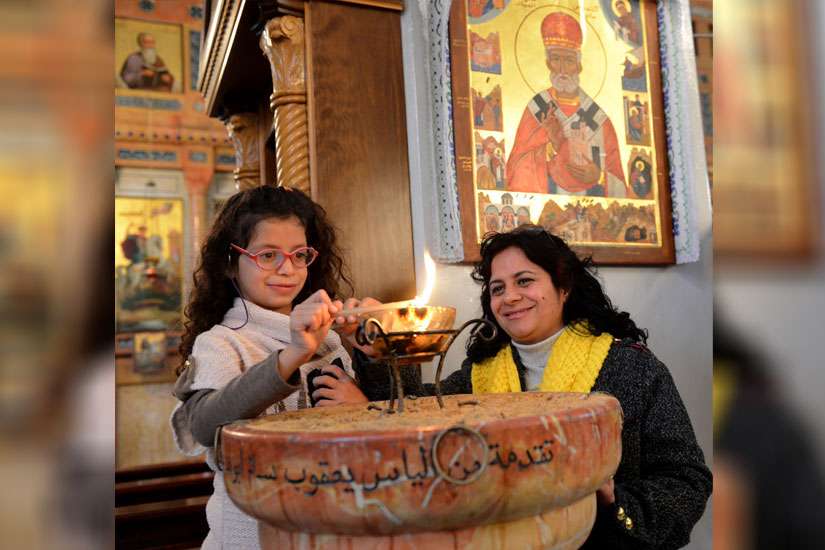"People believe he is the protector of the city," said Father Faysal Hijazen, parish priest of the Church of the Annunciation. "In all of the Christian houses here you will see pictures of St. Nicholas. They pray to him for protection, when they have any problem, even problems at home they pray to him."
He said every Christian family in Beit Jalla has at least one person name Nicholas.
The saint, who was born into a wealthy family, is a symbol of giving, generosity, dedication to God and humility. He is said to have come on a pilgrimage to the Holy Land and, according to Beit Jalla legend, he lived for four years in a tiny cave above which St. Nicholas Greek Orthodox Church now stands.
The residents also believe that the fourth-century saint has protected them during various armed conflicts in the area, including during the 1948 war of Israeli independence, when the Catholic parish priest reported seeing a man with a white beard standing on top of the Greek Orthodox Church with his arms open wide in a gesture of protection over the city.
More recently, said hairdresser Nicola Dukmak, 35, during the second intifada, a Palestinian gunman was positioned near the church during a gun battle with Israeli soldiers across the valley. The Palestinian said he saw a man with a white beard standing near the church protecting it from bullets.
Dukmak, who is Catholic, said his house is next to the Orthodox church; his family had to leave during the battle and trusted that St. Nicholas would protect their house -- which was not damaged.
"I am proud to have this name," he said. "I feel special because I am from Beit Jalla and I have this name of St. Nicholas, who protects us. It is a special name for Beit Jalla. If you meet someone named Nicholas, you can be almost sure he is from Beit Jalla."
Born in the third century in a village located on what is now the southern coast of Turkey, St. Nicholas was orphaned as a child and dedicated his life to serving God, using his inheritance to help the needy.
St. Nicholas was still young when he was made bishop of Myra, in the Asia Minor province of Lycia, is present-day Demre, Turkey. As bishop he became renowned for his generosity to the needy, his care for children and his concern for sailors.
He was persecuted for his faith by the Roman Emperor Diocletian and was exiled and imprisoned. Following his death Dec. 6, 343, he was buried in Myra. In 1087, when the Turks conquered the region, Christians feared they would not be allowed to visit the tomb, so Italian sailors removed the saint's relics to the Italian port city of Bari.
The Beit Jalla Orthodox church, which has numerous old and new icons of the saint, also has a St. Nicholas relic, which people come to venerate.
While in most of the United States St. Nicholas developed into Santa Claus, in more than 30 countries around the world the beginning of the Christmas season is marked with the separate celebration of St. Nicholas' feast day, when children are given gifts.
In many U.S. Catholic parishes and families with Dutch or German roots, the feast of St. Nicholas still is a prominent part of the holiday season. Such Christmas symbols as the candy cane, the hanging of stockings and the giving of oranges or tangerines have their roots in the story of St. Nicholas.
In Beit Jalla, which is 65 percent Christian with 2,000 Catholics, 5,000 Greek Orthodox and about 500 Lutherans, St. Nicholas day is celebrated jointly on the Greek Orthodox date, Dec. 19. Celebrations on the feast itself include greeting the Greek Orthodox patriarch, parades, prayers, dance, music and special family parties for those named after the saint.
Some 4,000 Muslims also live in Beit Jalla, and many of them attend the St. Nicholas festivities.
This is an important holiday for the Christian community of the area, said Father Hijazen, since in the area of Bethlehem and Jerusalem, Catholics and Orthodox do not celebrate Easter and Christmas together as they do in other parts of the West Bank.
He said he would attend part of the celebrations, which begin Dec. 18, St. Nicholas Eve, and his assistant, Father Simon Hijazeen, will attend the other parts.
"This day has a great significance for the unity of the church," said Father Hijazen, noting that there are little other opportunities for joint celebrations in the area. "When we look at this festival we see everyone in the city goes to pray, and people don't care about Greek Orthodox or Catholic. We need this feast to help the people (remember Christian unity), and the people help us by reminding us that we have to be one. We hope to arrive someday to be one as Christians."
Many people, including Catholics, stop by the Orthodox church to light a candle on the way to work during the week on a regular basis, said Father Hijazen.
Lorette Kassis, 40, said that people also tap three times on the door and say a prayer when they walk by the church; local tradition says St. Nicholas will grant the prayer of anyone who does so.
Local lore says years ago, during a drought, a woman would come by the church and knock on the door praying for rain. Finally, so the story goes, St. Nicholas tired of hearing her knock and granted her request.


